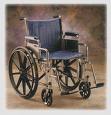Thursday, October 18, 2007
Handicapped parking spots used illegally
Q: Dear Jack, because of recent surgery, I'm handicapped. I really get angry at the people who ignore the spots reserved for handicapped people. What can be done about this? Security officers drove by and did nothing. A: First, talk to the store manager or mall manager to let them know security missed a vehicle which was illegally parked. Lt. David Gammill in Flowood and Lt. Norman Sipp in Ridgeland offered some other information. "Security officers are not authorized to enforce that," said Sipp, patrol division commander. "Handicapped parking comes under state law. Normally they'll call us and we send a police officer out to give the ticket." Gammill said Flowood does the same thing. You also can do the same. Figure out which city the store is in and then call the nonemergency number for the police department in that city.
Friday, September 28, 2007
Icy campus worse for some people
The next time you complain about how difficult it is to get around campus in snowy weather, keep in mind that for people with limited mobility, it can be a nightmare. People with wheelchairs, crutches and other forms of decreased mobility might find it hard get to class at all when the weather outside is frightful. Physical Plant officials said the hardest thing about the icy weather is making sure people with disabilities are fully accommodated. As with sidewalks, ramps can become extremely slippery and dangerous in this type of weather. Doors can be hard to open when theres a two-inch layer of ice coating the path in front of them. Its absolutely essential these areas stay operable in icy conditions. Although the universitys snow and ice plan lists ADA entrances as its highest priority, there have still been complaints about general accessibility.
Friday, September 14, 2007
Disability rules to affect foreign cruises
A proposed set of regulations based on the Americans with Disabilities Act would affect all U.S. cruise ships and all foreign cruise ships at U.S. docks. The proposal is on hold pending public comment but the government should finalize it later this year. The South Florida Sun-Sentinel reported that the federal government's proposed rules would ban discriminatory practices aboard such vessels and would likely force all cruise ships docked in U.S. ports to become more accessible to the handicapped. International Council of Cruise Lines exec Ted Thompson said the implications of the proposal would not fully be known until any new ship design guidelines are revealed. It is difficult to analyze the impact of these regulations until we know more regarding the content of the guidelines, Thompson said.
Saturday, August 18, 2007
What about wheelchairs?
Rob Cunningham, director of the Office of Disability Services, said there weren't any laws that included handicapped regulations on college campuses.
Most buildings on campus aren't handicapped accessible because this institution was built before all universities were required to handicap accessibility, Cunnigham added.
"Most Greek houses on campus, just like other buildings on campus, do not have the ability [to be handicapped accessible] because the University was built before that was even required," Cunnigham said.
Confirming the problems with handicap inaccessibility is the Office of Greek Affairs.
"When the buildings were built in the late 1940s and 50s, there wasn't a great need for handicapped accessibility, and it wasn't a requirement for Universities to have this," said Tim Carney, associate director for Residence Life.
Most buildings on campus aren't handicapped accessible because this institution was built before all universities were required to handicap accessibility, Cunnigham added.
"Most Greek houses on campus, just like other buildings on campus, do not have the ability [to be handicapped accessible] because the University was built before that was even required," Cunnigham said.
Confirming the problems with handicap inaccessibility is the Office of Greek Affairs.
"When the buildings were built in the late 1940s and 50s, there wasn't a great need for handicapped accessibility, and it wasn't a requirement for Universities to have this," said Tim Carney, associate director for Residence Life.
Subscribe to:
Posts (Atom)
